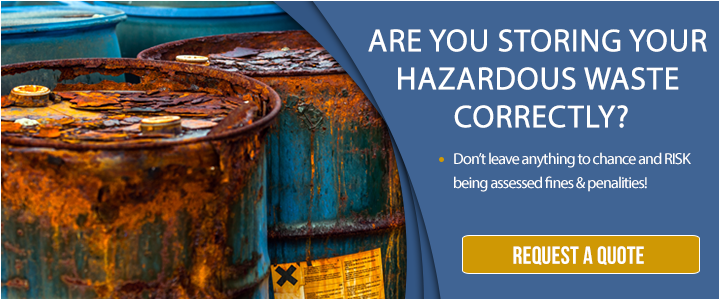For hazardous waste generators, understanding the basics for the safe handling of hazardous materials can keep your employees from catastrophic injury, your facility from accidents and fines that accompany them.
Because injuries can result from improperly handling and storing materials, workers should also be aware of accidents that may result from the unsafe or improper handling of equipment as well as from improper work practices.
We’ve created a list of basic rules for you to evaluate your current work environment and discuss at your next safety meeting to ensure that your employees know how to handle materials safely.
What To Know Before Moving, Handling And Storing
For employees who work with hazardous chemicals in your workplace, proper training is crucial to keep them and the.png?width=300&height=251&name=Hazardous%20Waste%20Disposal-Bebas%20Neue%20(8).png) other workers in your facility safe.
other workers in your facility safe.
Here are a few guidelines before getting started handling toxic substances in your facility:
- Follow all established procedures and perform job duties according to your training.
- Be cautious and plan ahead. Prepare for things that could go wrong and pay close attention to what you’re doing while you work.
- Always use appropriate Personal Protective Equipment (PPE). Make sure to inspect it carefully before each use to make sure it’s suitable. Replace worn out or damaged PPE that won’t provide adequate protection.
- Learn about emergency procedures. Understanding emergency procedures means knowing evacuation procedures, emergency reporting procedures and procedures for dealing with fires and spills.
- Know what to do in a medical emergency, if a co-worker is injured or overcome by chemicals.
- Keep you and your work area clean. After handling any material, wash your hands thoroughly with soap and water. Clean work surfaces at least once a shift so that contamination risks are minimized.
- Never eat or drink while handling any materials, and if your hands are contaminated, don’t use cosmetics or handle contact lenses.
One of the most important tips for handling hazardous waste is to work with an experienced hazardous waste disposal company to make sure even after the waste leaves your property, it is safe and legally disposed of.
Need more tips? Check out our article, The Top 10 Best Practices For Proper Chemical Storage.
Understanding Hazardous Materials In Your Facility
Employees should understand the potential hazards of each chemical and substance that they will work with and how to control their workplace to minimize any danger.
Employees can understand their risks in several ways, but the following federal regulations should be implemented.
- Make sure all containers are properly labeled and that the material is contained in an appropriate container.
- Don’t use any material that is not contained or labeled properly.
- Report any damaged containers or illegible labels to your supervisor right away.
- Read labels and the material safety data sheet (MSDS) before using any material to make sure you understand hazards and precautions.
- Use all materials solely for their intended purpose. For example, don’t use solvents to clean your hands or gasoline to wipe down equipment.
- Understand what materials fall under electronic waste and why it’s important to dispose of e-waste properly.
An important part of understanding hazardous materials in your facility is grasping 40 CFR (Code of Federal Regulations). These focus on environmental protection and regulations established by the U.S. Environmental Protection Agency (EPA). Among 40 CFR parts are regulations for controlling air pollution, oil pollution prevention and hazardous waste identification through the Resource Conservation and Recovery Act (RCRA).
Storage And Collection Areas
Improperly managed central storage and satellite accumulation points can lead to big fines by federal and state regulators and can lead to accidents. It is important to pay careful attention to how these areas are managed.
Here are some best practices include:
- Make sure all industrial waste is properly marked as hazardous.
- Keep lids on containers always. The term “closed” means leak proof and vapor tight.
- Store all materials properly, separate incompatibles, and store in ventilated, dry, cool areas.
- Keep storage areas free from accumulated materials that cause tripping, fires or explosions, or that may contribute to the harboring of rats and other pests
- Do not store more than 55 gallons in satellite accumulation points. Hazardous waste regulations allow you to store up to 55 gallons of hazardous waste at the point of generation provided that the operator has control over the waste. Any more than that and you could be fined during an inspection.
This is just a basic list of safety rules to keep your facility operating safely. You’ll undoubtedly have other safety rules to add to the list.
A good practice is to present these rules in your next safety meeting and get employees involved in helping you add to the list. By getting their input, you can create a sense of ownership over your safe chemical handling rules.
To employees, they’ll be “our” rules rather than “their” rules. What other rules do you have to add to the list?


Comment